Critical Review: Case Management & Mental Health Recovery in Australia
VerifiedAdded on 2023/04/11
|15
|3776
|334
Literature Review
AI Summary
This literature review examines the role of case management in the mental health recovery process, particularly within community-based settings. It begins by contrasting the traditional paternalistic medical model with the recovery-oriented approach that emphasizes patient autonomy and empowerment. The review then delves into the concept of mental recovery, highlighting its focus on personal responsibility, hope, and effective disability management. Different case management models are explored, including Assertive Community Treatment (ACT) and Community Psychiatric Support and Treatment (CPST), with a specific focus on the strengths model, which emphasizes an individual's capabilities and potential rather than their pathology. The review also discusses the implementation of these principles in the Australian context, aligning with the global trend towards integrating mental health services within the community.
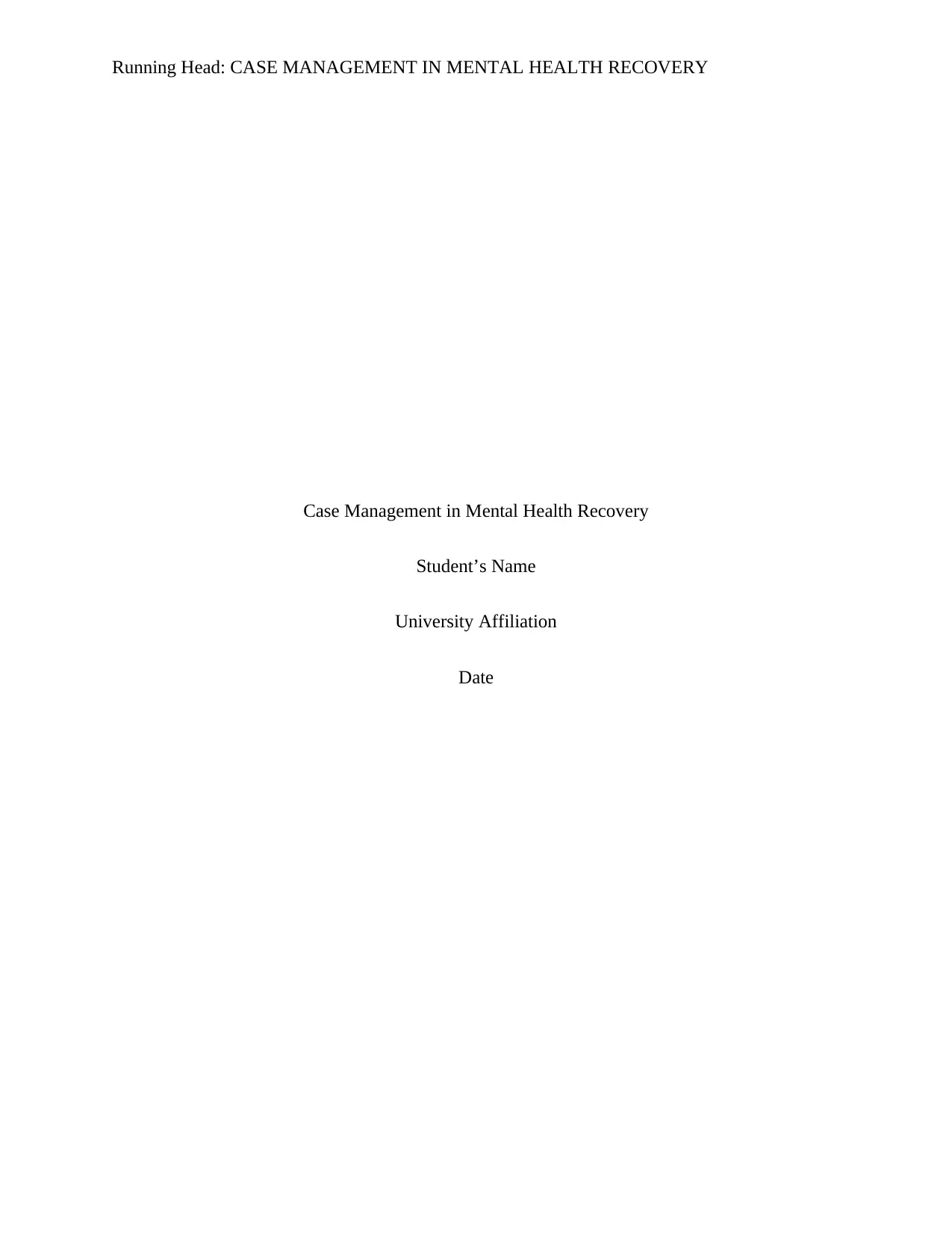
Running Head: CASE MANAGEMENT IN MENTAL HEALTH RECOVERY
Case Management in Mental Health Recovery
Student’s Name
University Affiliation
Date
Case Management in Mental Health Recovery
Student’s Name
University Affiliation
Date
Paraphrase This Document
Need a fresh take? Get an instant paraphrase of this document with our AI Paraphraser
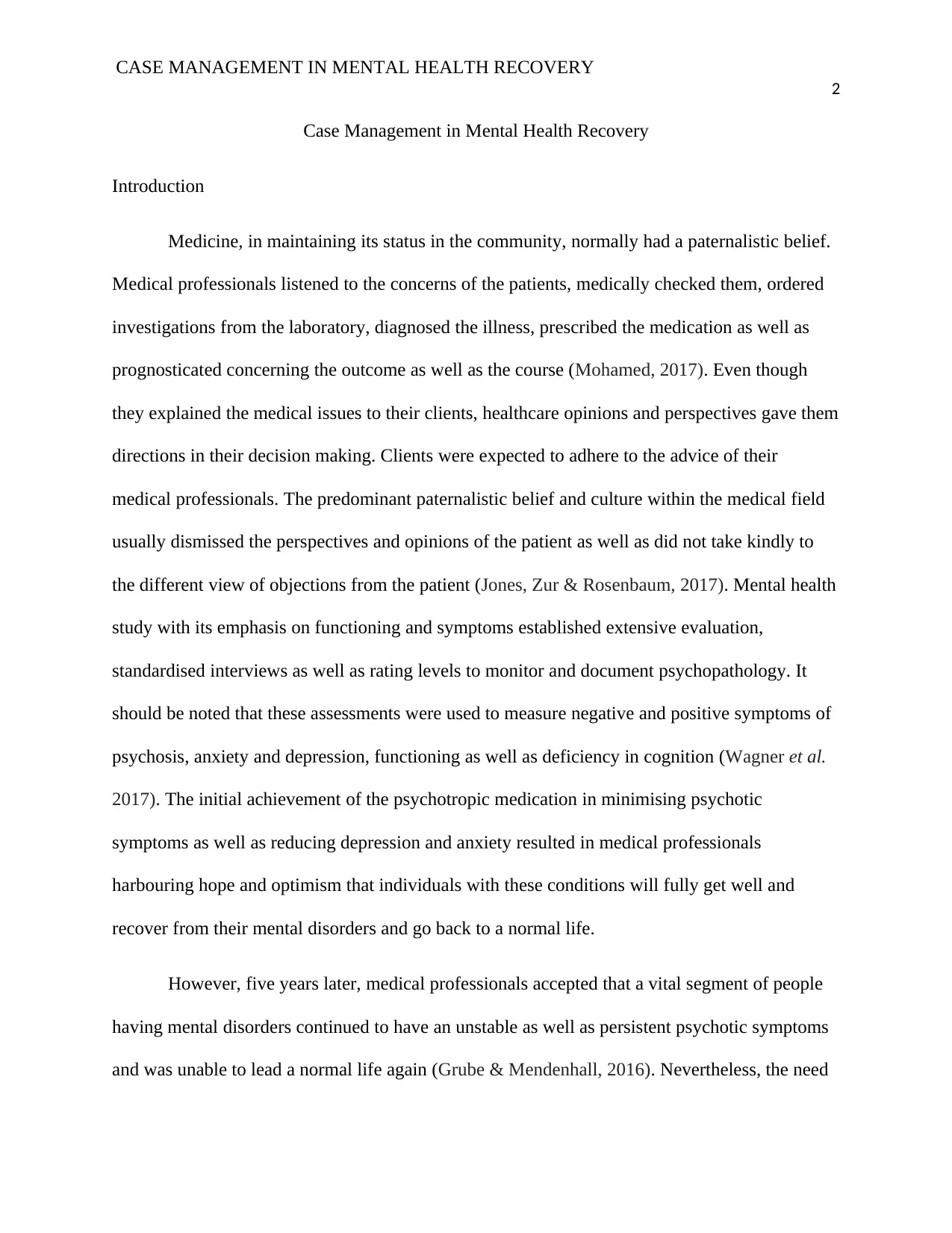
CASE MANAGEMENT IN MENTAL HEALTH RECOVERY
2
Case Management in Mental Health Recovery
Introduction
Medicine, in maintaining its status in the community, normally had a paternalistic belief.
Medical professionals listened to the concerns of the patients, medically checked them, ordered
investigations from the laboratory, diagnosed the illness, prescribed the medication as well as
prognosticated concerning the outcome as well as the course (Mohamed, 2017). Even though
they explained the medical issues to their clients, healthcare opinions and perspectives gave them
directions in their decision making. Clients were expected to adhere to the advice of their
medical professionals. The predominant paternalistic belief and culture within the medical field
usually dismissed the perspectives and opinions of the patient as well as did not take kindly to
the different view of objections from the patient (Jones, Zur & Rosenbaum, 2017). Mental health
study with its emphasis on functioning and symptoms established extensive evaluation,
standardised interviews as well as rating levels to monitor and document psychopathology. It
should be noted that these assessments were used to measure negative and positive symptoms of
psychosis, anxiety and depression, functioning as well as deficiency in cognition (Wagner et al.
2017). The initial achievement of the psychotropic medication in minimising psychotic
symptoms as well as reducing depression and anxiety resulted in medical professionals
harbouring hope and optimism that individuals with these conditions will fully get well and
recover from their mental disorders and go back to a normal life.
However, five years later, medical professionals accepted that a vital segment of people
having mental disorders continued to have an unstable as well as persistent psychotic symptoms
and was unable to lead a normal life again (Grube & Mendenhall, 2016). Nevertheless, the need
2
Case Management in Mental Health Recovery
Introduction
Medicine, in maintaining its status in the community, normally had a paternalistic belief.
Medical professionals listened to the concerns of the patients, medically checked them, ordered
investigations from the laboratory, diagnosed the illness, prescribed the medication as well as
prognosticated concerning the outcome as well as the course (Mohamed, 2017). Even though
they explained the medical issues to their clients, healthcare opinions and perspectives gave them
directions in their decision making. Clients were expected to adhere to the advice of their
medical professionals. The predominant paternalistic belief and culture within the medical field
usually dismissed the perspectives and opinions of the patient as well as did not take kindly to
the different view of objections from the patient (Jones, Zur & Rosenbaum, 2017). Mental health
study with its emphasis on functioning and symptoms established extensive evaluation,
standardised interviews as well as rating levels to monitor and document psychopathology. It
should be noted that these assessments were used to measure negative and positive symptoms of
psychosis, anxiety and depression, functioning as well as deficiency in cognition (Wagner et al.
2017). The initial achievement of the psychotropic medication in minimising psychotic
symptoms as well as reducing depression and anxiety resulted in medical professionals
harbouring hope and optimism that individuals with these conditions will fully get well and
recover from their mental disorders and go back to a normal life.
However, five years later, medical professionals accepted that a vital segment of people
having mental disorders continued to have an unstable as well as persistent psychotic symptoms
and was unable to lead a normal life again (Grube & Mendenhall, 2016). Nevertheless, the need
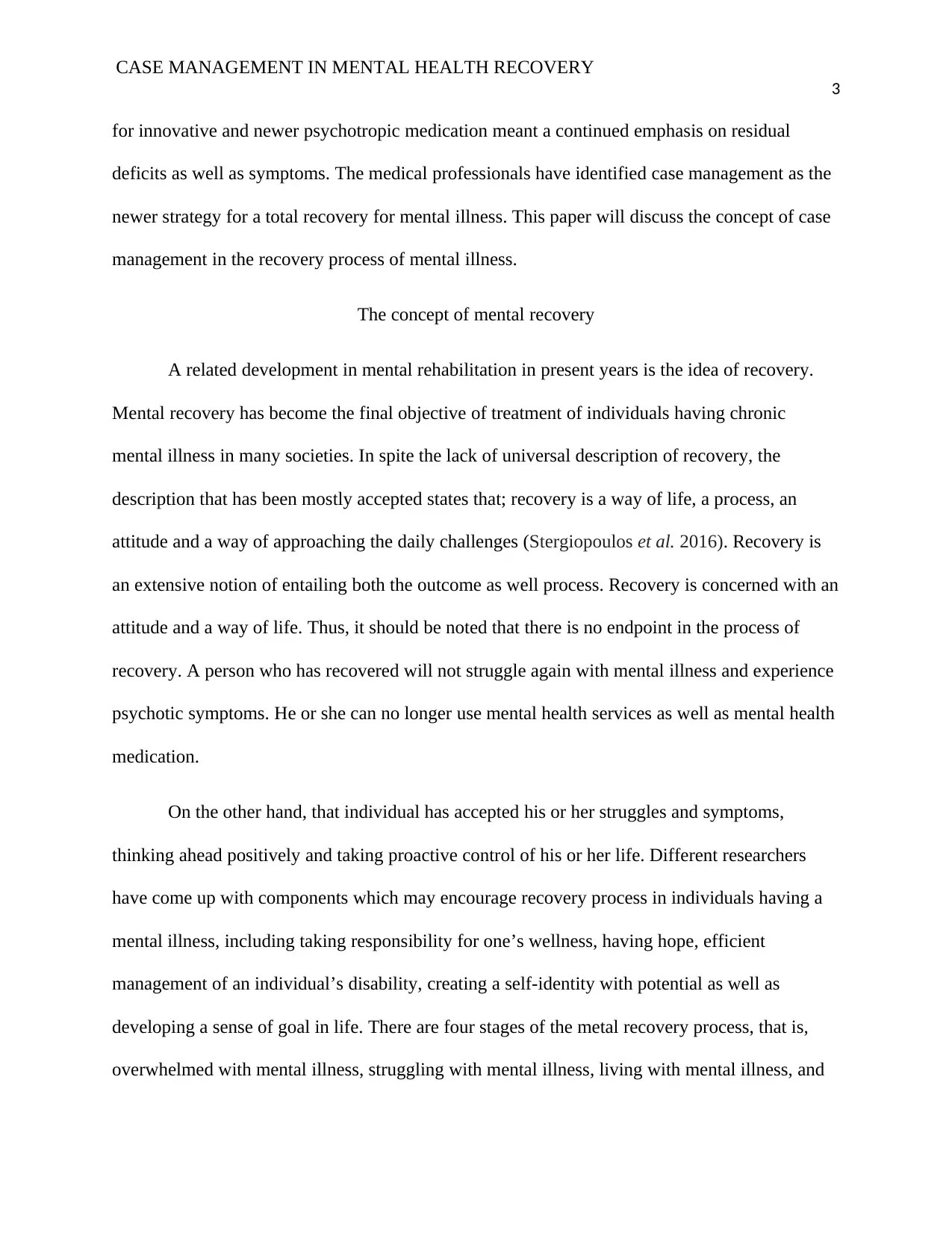
CASE MANAGEMENT IN MENTAL HEALTH RECOVERY
3
for innovative and newer psychotropic medication meant a continued emphasis on residual
deficits as well as symptoms. The medical professionals have identified case management as the
newer strategy for a total recovery for mental illness. This paper will discuss the concept of case
management in the recovery process of mental illness.
The concept of mental recovery
A related development in mental rehabilitation in present years is the idea of recovery.
Mental recovery has become the final objective of treatment of individuals having chronic
mental illness in many societies. In spite the lack of universal description of recovery, the
description that has been mostly accepted states that; recovery is a way of life, a process, an
attitude and a way of approaching the daily challenges (Stergiopoulos et al. 2016). Recovery is
an extensive notion of entailing both the outcome as well process. Recovery is concerned with an
attitude and a way of life. Thus, it should be noted that there is no endpoint in the process of
recovery. A person who has recovered will not struggle again with mental illness and experience
psychotic symptoms. He or she can no longer use mental health services as well as mental health
medication.
On the other hand, that individual has accepted his or her struggles and symptoms,
thinking ahead positively and taking proactive control of his or her life. Different researchers
have come up with components which may encourage recovery process in individuals having a
mental illness, including taking responsibility for one’s wellness, having hope, efficient
management of an individual’s disability, creating a self-identity with potential as well as
developing a sense of goal in life. There are four stages of the metal recovery process, that is,
overwhelmed with mental illness, struggling with mental illness, living with mental illness, and
3
for innovative and newer psychotropic medication meant a continued emphasis on residual
deficits as well as symptoms. The medical professionals have identified case management as the
newer strategy for a total recovery for mental illness. This paper will discuss the concept of case
management in the recovery process of mental illness.
The concept of mental recovery
A related development in mental rehabilitation in present years is the idea of recovery.
Mental recovery has become the final objective of treatment of individuals having chronic
mental illness in many societies. In spite the lack of universal description of recovery, the
description that has been mostly accepted states that; recovery is a way of life, a process, an
attitude and a way of approaching the daily challenges (Stergiopoulos et al. 2016). Recovery is
an extensive notion of entailing both the outcome as well process. Recovery is concerned with an
attitude and a way of life. Thus, it should be noted that there is no endpoint in the process of
recovery. A person who has recovered will not struggle again with mental illness and experience
psychotic symptoms. He or she can no longer use mental health services as well as mental health
medication.
On the other hand, that individual has accepted his or her struggles and symptoms,
thinking ahead positively and taking proactive control of his or her life. Different researchers
have come up with components which may encourage recovery process in individuals having a
mental illness, including taking responsibility for one’s wellness, having hope, efficient
management of an individual’s disability, creating a self-identity with potential as well as
developing a sense of goal in life. There are four stages of the metal recovery process, that is,
overwhelmed with mental illness, struggling with mental illness, living with mental illness, and
⊘ This is a preview!⊘
Do you want full access?
Subscribe today to unlock all pages.

Trusted by 1+ million students worldwide
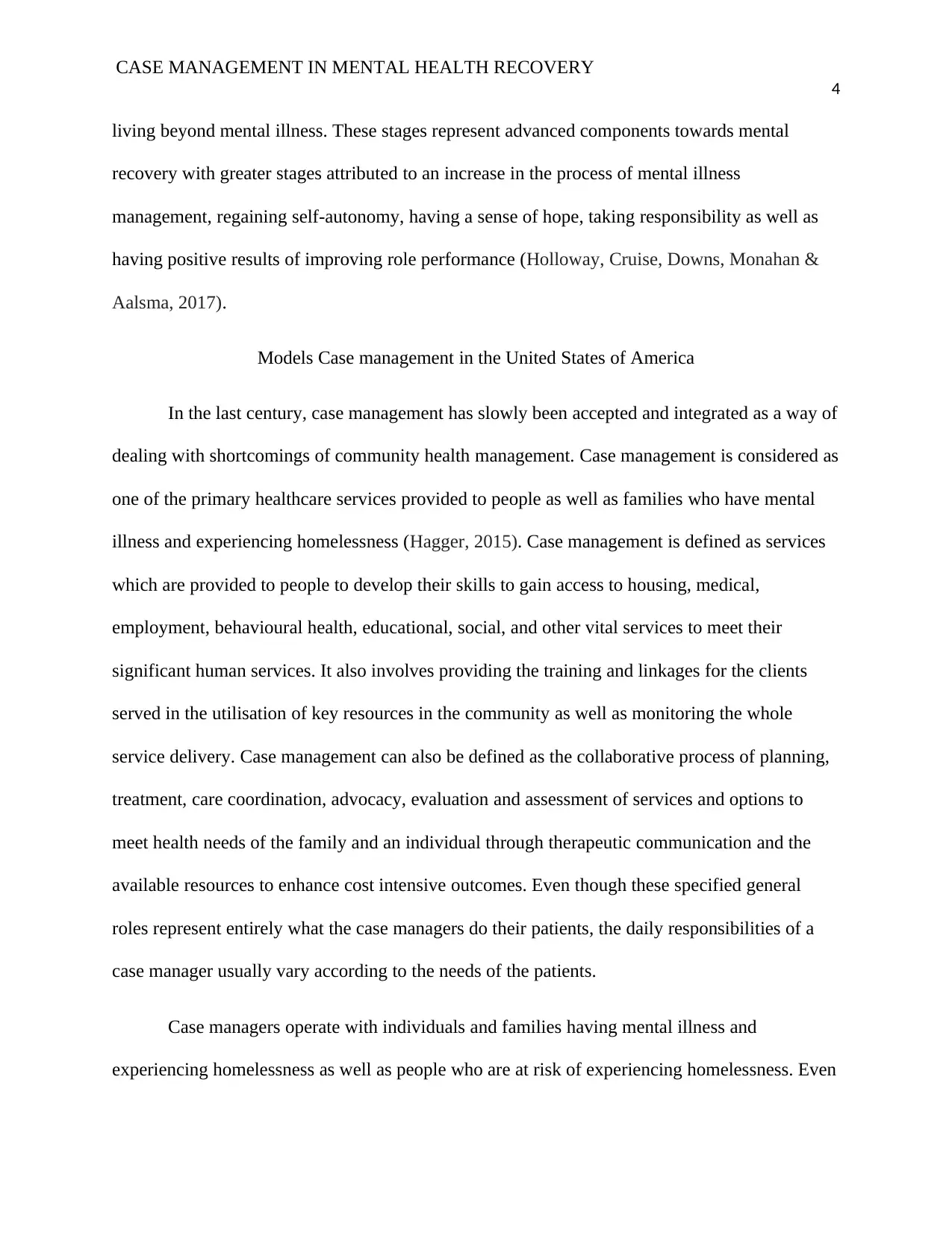
CASE MANAGEMENT IN MENTAL HEALTH RECOVERY
4
living beyond mental illness. These stages represent advanced components towards mental
recovery with greater stages attributed to an increase in the process of mental illness
management, regaining self-autonomy, having a sense of hope, taking responsibility as well as
having positive results of improving role performance (Holloway, Cruise, Downs, Monahan &
Aalsma, 2017).
Models Case management in the United States of America
In the last century, case management has slowly been accepted and integrated as a way of
dealing with shortcomings of community health management. Case management is considered as
one of the primary healthcare services provided to people as well as families who have mental
illness and experiencing homelessness (Hagger, 2015). Case management is defined as services
which are provided to people to develop their skills to gain access to housing, medical,
employment, behavioural health, educational, social, and other vital services to meet their
significant human services. It also involves providing the training and linkages for the clients
served in the utilisation of key resources in the community as well as monitoring the whole
service delivery. Case management can also be defined as the collaborative process of planning,
treatment, care coordination, advocacy, evaluation and assessment of services and options to
meet health needs of the family and an individual through therapeutic communication and the
available resources to enhance cost intensive outcomes. Even though these specified general
roles represent entirely what the case managers do their patients, the daily responsibilities of a
case manager usually vary according to the needs of the patients.
Case managers operate with individuals and families having mental illness and
experiencing homelessness as well as people who are at risk of experiencing homelessness. Even
4
living beyond mental illness. These stages represent advanced components towards mental
recovery with greater stages attributed to an increase in the process of mental illness
management, regaining self-autonomy, having a sense of hope, taking responsibility as well as
having positive results of improving role performance (Holloway, Cruise, Downs, Monahan &
Aalsma, 2017).
Models Case management in the United States of America
In the last century, case management has slowly been accepted and integrated as a way of
dealing with shortcomings of community health management. Case management is considered as
one of the primary healthcare services provided to people as well as families who have mental
illness and experiencing homelessness (Hagger, 2015). Case management is defined as services
which are provided to people to develop their skills to gain access to housing, medical,
employment, behavioural health, educational, social, and other vital services to meet their
significant human services. It also involves providing the training and linkages for the clients
served in the utilisation of key resources in the community as well as monitoring the whole
service delivery. Case management can also be defined as the collaborative process of planning,
treatment, care coordination, advocacy, evaluation and assessment of services and options to
meet health needs of the family and an individual through therapeutic communication and the
available resources to enhance cost intensive outcomes. Even though these specified general
roles represent entirely what the case managers do their patients, the daily responsibilities of a
case manager usually vary according to the needs of the patients.
Case managers operate with individuals and families having mental illness and
experiencing homelessness as well as people who are at risk of experiencing homelessness. Even
Paraphrase This Document
Need a fresh take? Get an instant paraphrase of this document with our AI Paraphraser
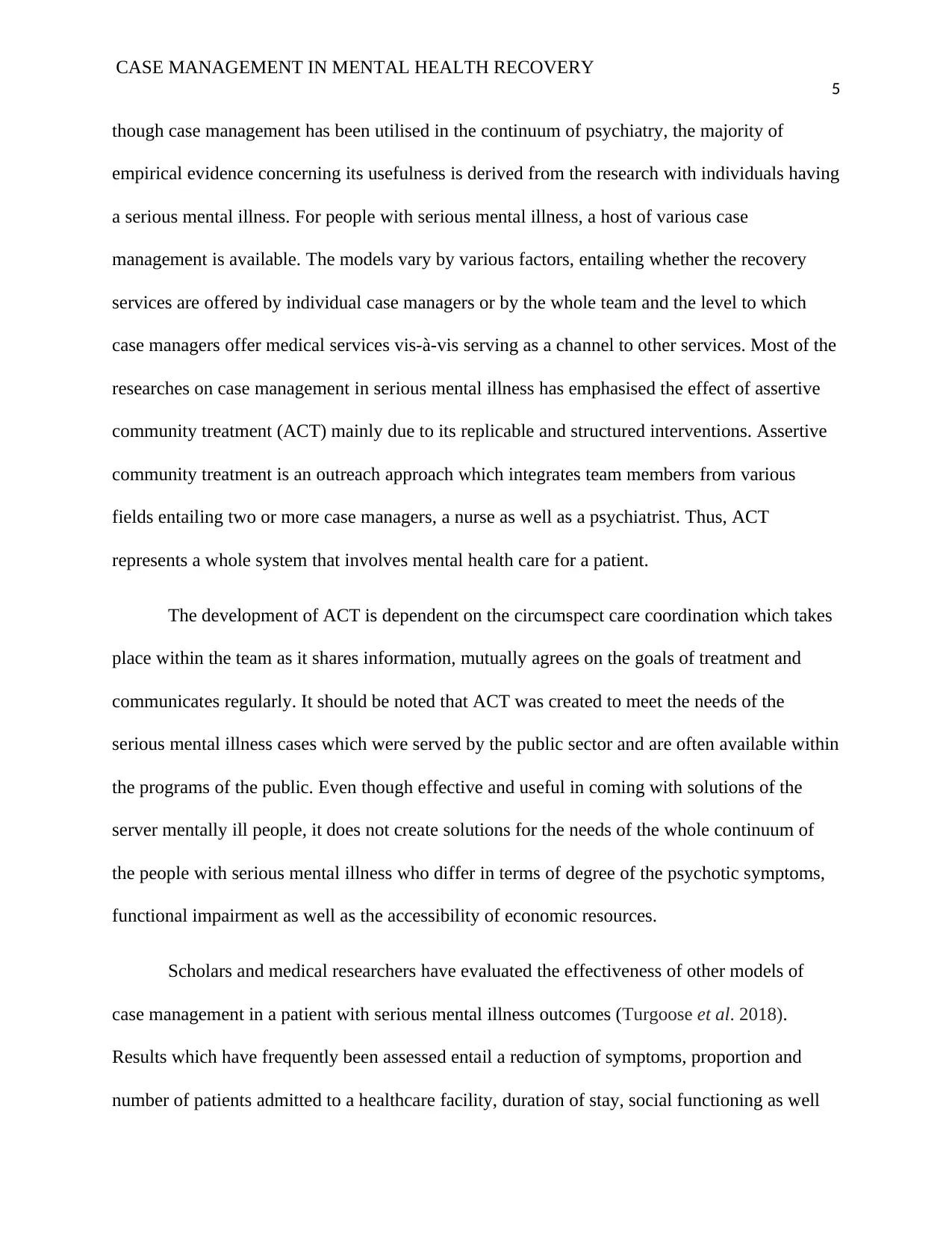
CASE MANAGEMENT IN MENTAL HEALTH RECOVERY
5
though case management has been utilised in the continuum of psychiatry, the majority of
empirical evidence concerning its usefulness is derived from the research with individuals having
a serious mental illness. For people with serious mental illness, a host of various case
management is available. The models vary by various factors, entailing whether the recovery
services are offered by individual case managers or by the whole team and the level to which
case managers offer medical services vis-à-vis serving as a channel to other services. Most of the
researches on case management in serious mental illness has emphasised the effect of assertive
community treatment (ACT) mainly due to its replicable and structured interventions. Assertive
community treatment is an outreach approach which integrates team members from various
fields entailing two or more case managers, a nurse as well as a psychiatrist. Thus, ACT
represents a whole system that involves mental health care for a patient.
The development of ACT is dependent on the circumspect care coordination which takes
place within the team as it shares information, mutually agrees on the goals of treatment and
communicates regularly. It should be noted that ACT was created to meet the needs of the
serious mental illness cases which were served by the public sector and are often available within
the programs of the public. Even though effective and useful in coming with solutions of the
server mentally ill people, it does not create solutions for the needs of the whole continuum of
the people with serious mental illness who differ in terms of degree of the psychotic symptoms,
functional impairment as well as the accessibility of economic resources.
Scholars and medical researchers have evaluated the effectiveness of other models of
case management in a patient with serious mental illness outcomes (Turgoose et al. 2018).
Results which have frequently been assessed entail a reduction of symptoms, proportion and
number of patients admitted to a healthcare facility, duration of stay, social functioning as well
5
though case management has been utilised in the continuum of psychiatry, the majority of
empirical evidence concerning its usefulness is derived from the research with individuals having
a serious mental illness. For people with serious mental illness, a host of various case
management is available. The models vary by various factors, entailing whether the recovery
services are offered by individual case managers or by the whole team and the level to which
case managers offer medical services vis-à-vis serving as a channel to other services. Most of the
researches on case management in serious mental illness has emphasised the effect of assertive
community treatment (ACT) mainly due to its replicable and structured interventions. Assertive
community treatment is an outreach approach which integrates team members from various
fields entailing two or more case managers, a nurse as well as a psychiatrist. Thus, ACT
represents a whole system that involves mental health care for a patient.
The development of ACT is dependent on the circumspect care coordination which takes
place within the team as it shares information, mutually agrees on the goals of treatment and
communicates regularly. It should be noted that ACT was created to meet the needs of the
serious mental illness cases which were served by the public sector and are often available within
the programs of the public. Even though effective and useful in coming with solutions of the
server mentally ill people, it does not create solutions for the needs of the whole continuum of
the people with serious mental illness who differ in terms of degree of the psychotic symptoms,
functional impairment as well as the accessibility of economic resources.
Scholars and medical researchers have evaluated the effectiveness of other models of
case management in a patient with serious mental illness outcomes (Turgoose et al. 2018).
Results which have frequently been assessed entail a reduction of symptoms, proportion and
number of patients admitted to a healthcare facility, duration of stay, social functioning as well
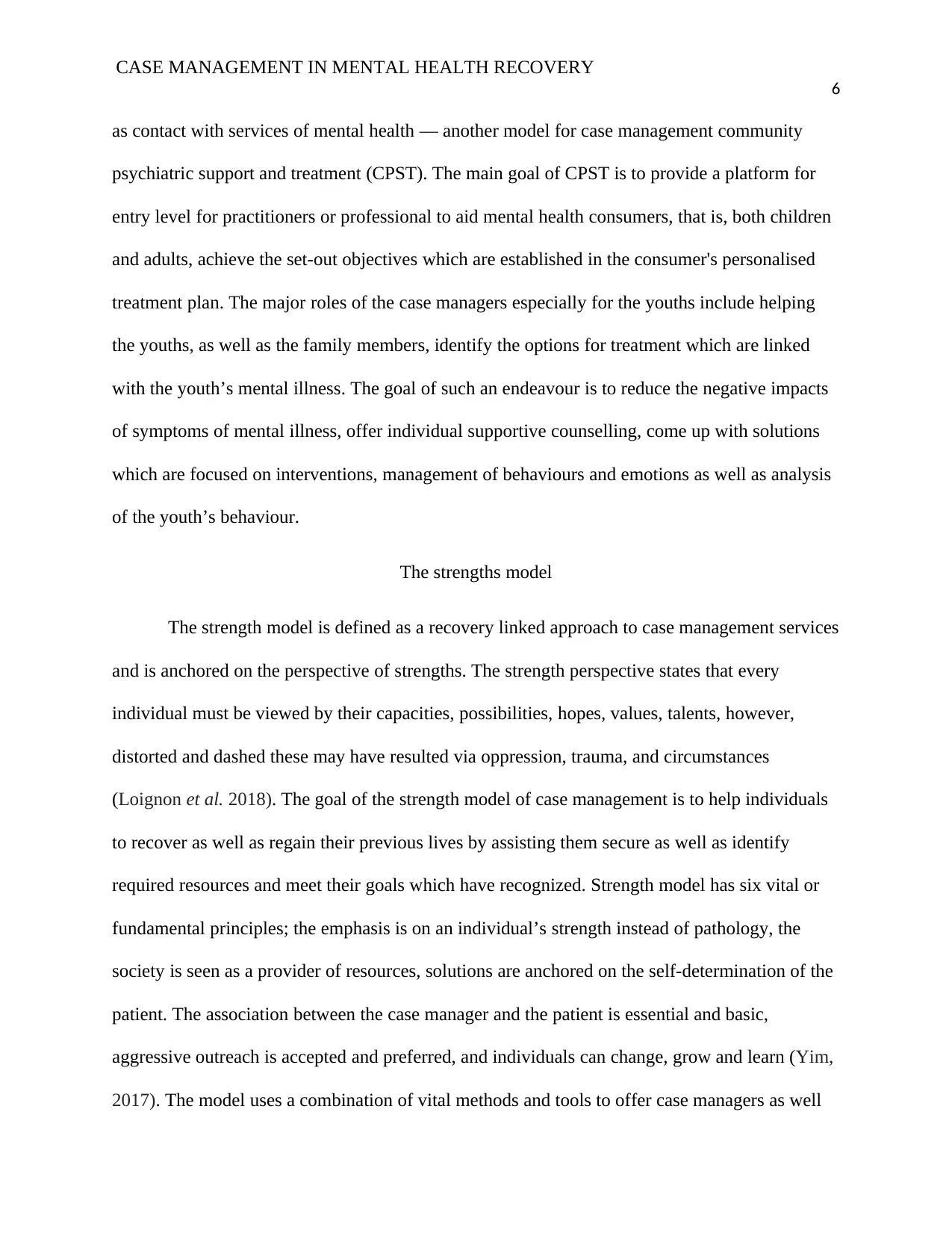
CASE MANAGEMENT IN MENTAL HEALTH RECOVERY
6
as contact with services of mental health — another model for case management community
psychiatric support and treatment (CPST). The main goal of CPST is to provide a platform for
entry level for practitioners or professional to aid mental health consumers, that is, both children
and adults, achieve the set-out objectives which are established in the consumer's personalised
treatment plan. The major roles of the case managers especially for the youths include helping
the youths, as well as the family members, identify the options for treatment which are linked
with the youth’s mental illness. The goal of such an endeavour is to reduce the negative impacts
of symptoms of mental illness, offer individual supportive counselling, come up with solutions
which are focused on interventions, management of behaviours and emotions as well as analysis
of the youth’s behaviour.
The strengths model
The strength model is defined as a recovery linked approach to case management services
and is anchored on the perspective of strengths. The strength perspective states that every
individual must be viewed by their capacities, possibilities, hopes, values, talents, however,
distorted and dashed these may have resulted via oppression, trauma, and circumstances
(Loignon et al. 2018). The goal of the strength model of case management is to help individuals
to recover as well as regain their previous lives by assisting them secure as well as identify
required resources and meet their goals which have recognized. Strength model has six vital or
fundamental principles; the emphasis is on an individual’s strength instead of pathology, the
society is seen as a provider of resources, solutions are anchored on the self-determination of the
patient. The association between the case manager and the patient is essential and basic,
aggressive outreach is accepted and preferred, and individuals can change, grow and learn (Yim,
2017). The model uses a combination of vital methods and tools to offer case managers as well
6
as contact with services of mental health — another model for case management community
psychiatric support and treatment (CPST). The main goal of CPST is to provide a platform for
entry level for practitioners or professional to aid mental health consumers, that is, both children
and adults, achieve the set-out objectives which are established in the consumer's personalised
treatment plan. The major roles of the case managers especially for the youths include helping
the youths, as well as the family members, identify the options for treatment which are linked
with the youth’s mental illness. The goal of such an endeavour is to reduce the negative impacts
of symptoms of mental illness, offer individual supportive counselling, come up with solutions
which are focused on interventions, management of behaviours and emotions as well as analysis
of the youth’s behaviour.
The strengths model
The strength model is defined as a recovery linked approach to case management services
and is anchored on the perspective of strengths. The strength perspective states that every
individual must be viewed by their capacities, possibilities, hopes, values, talents, however,
distorted and dashed these may have resulted via oppression, trauma, and circumstances
(Loignon et al. 2018). The goal of the strength model of case management is to help individuals
to recover as well as regain their previous lives by assisting them secure as well as identify
required resources and meet their goals which have recognized. Strength model has six vital or
fundamental principles; the emphasis is on an individual’s strength instead of pathology, the
society is seen as a provider of resources, solutions are anchored on the self-determination of the
patient. The association between the case manager and the patient is essential and basic,
aggressive outreach is accepted and preferred, and individuals can change, grow and learn (Yim,
2017). The model uses a combination of vital methods and tools to offer case managers as well
⊘ This is a preview!⊘
Do you want full access?
Subscribe today to unlock all pages.

Trusted by 1+ million students worldwide
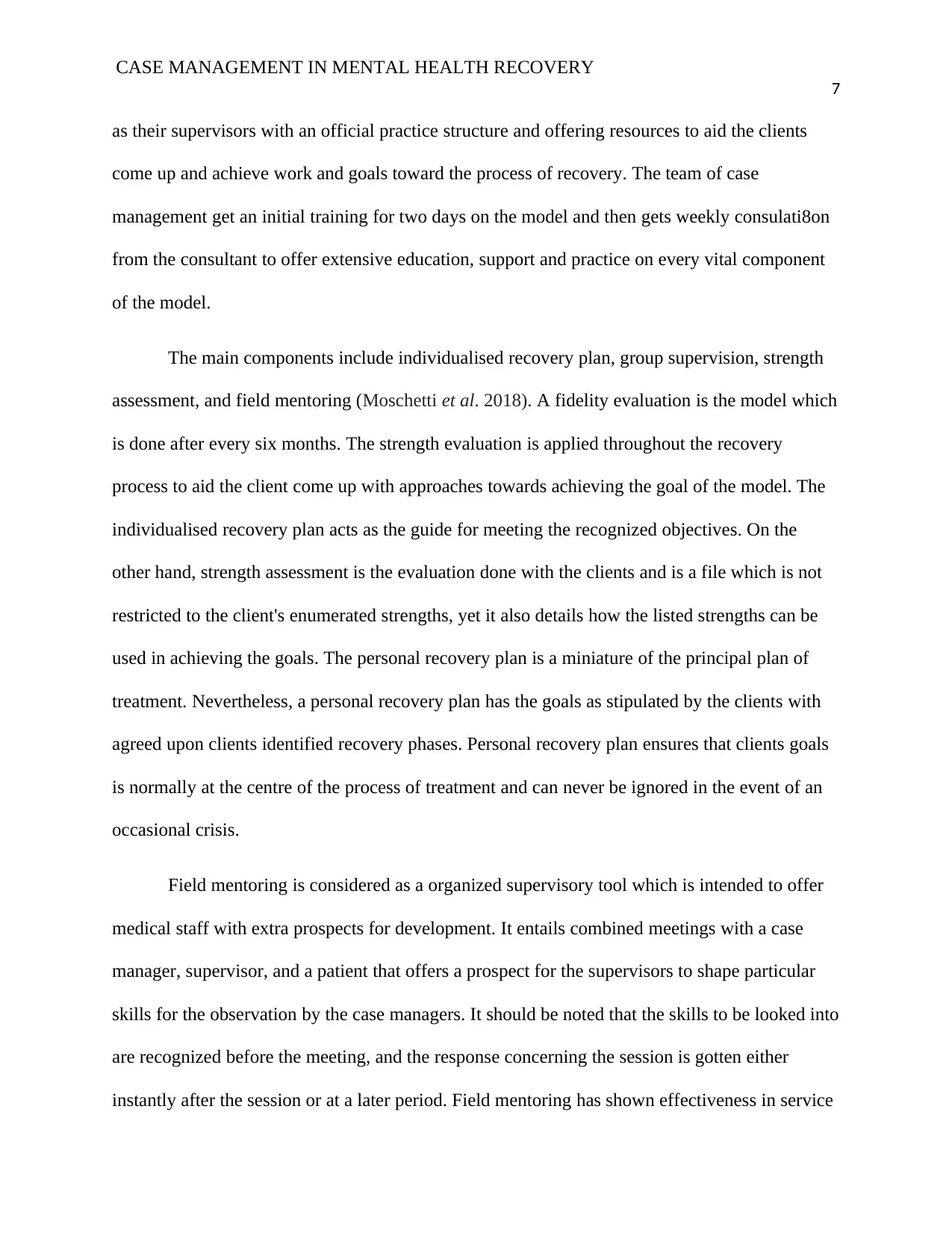
CASE MANAGEMENT IN MENTAL HEALTH RECOVERY
7
as their supervisors with an official practice structure and offering resources to aid the clients
come up and achieve work and goals toward the process of recovery. The team of case
management get an initial training for two days on the model and then gets weekly consulati8on
from the consultant to offer extensive education, support and practice on every vital component
of the model.
The main components include individualised recovery plan, group supervision, strength
assessment, and field mentoring (Moschetti et al. 2018). A fidelity evaluation is the model which
is done after every six months. The strength evaluation is applied throughout the recovery
process to aid the client come up with approaches towards achieving the goal of the model. The
individualised recovery plan acts as the guide for meeting the recognized objectives. On the
other hand, strength assessment is the evaluation done with the clients and is a file which is not
restricted to the client's enumerated strengths, yet it also details how the listed strengths can be
used in achieving the goals. The personal recovery plan is a miniature of the principal plan of
treatment. Nevertheless, a personal recovery plan has the goals as stipulated by the clients with
agreed upon clients identified recovery phases. Personal recovery plan ensures that clients goals
is normally at the centre of the process of treatment and can never be ignored in the event of an
occasional crisis.
Field mentoring is considered as a organized supervisory tool which is intended to offer
medical staff with extra prospects for development. It entails combined meetings with a case
manager, supervisor, and a patient that offers a prospect for the supervisors to shape particular
skills for the observation by the case managers. It should be noted that the skills to be looked into
are recognized before the meeting, and the response concerning the session is gotten either
instantly after the session or at a later period. Field mentoring has shown effectiveness in service
7
as their supervisors with an official practice structure and offering resources to aid the clients
come up and achieve work and goals toward the process of recovery. The team of case
management get an initial training for two days on the model and then gets weekly consulati8on
from the consultant to offer extensive education, support and practice on every vital component
of the model.
The main components include individualised recovery plan, group supervision, strength
assessment, and field mentoring (Moschetti et al. 2018). A fidelity evaluation is the model which
is done after every six months. The strength evaluation is applied throughout the recovery
process to aid the client come up with approaches towards achieving the goal of the model. The
individualised recovery plan acts as the guide for meeting the recognized objectives. On the
other hand, strength assessment is the evaluation done with the clients and is a file which is not
restricted to the client's enumerated strengths, yet it also details how the listed strengths can be
used in achieving the goals. The personal recovery plan is a miniature of the principal plan of
treatment. Nevertheless, a personal recovery plan has the goals as stipulated by the clients with
agreed upon clients identified recovery phases. Personal recovery plan ensures that clients goals
is normally at the centre of the process of treatment and can never be ignored in the event of an
occasional crisis.
Field mentoring is considered as a organized supervisory tool which is intended to offer
medical staff with extra prospects for development. It entails combined meetings with a case
manager, supervisor, and a patient that offers a prospect for the supervisors to shape particular
skills for the observation by the case managers. It should be noted that the skills to be looked into
are recognized before the meeting, and the response concerning the session is gotten either
instantly after the session or at a later period. Field mentoring has shown effectiveness in service
Paraphrase This Document
Need a fresh take? Get an instant paraphrase of this document with our AI Paraphraser
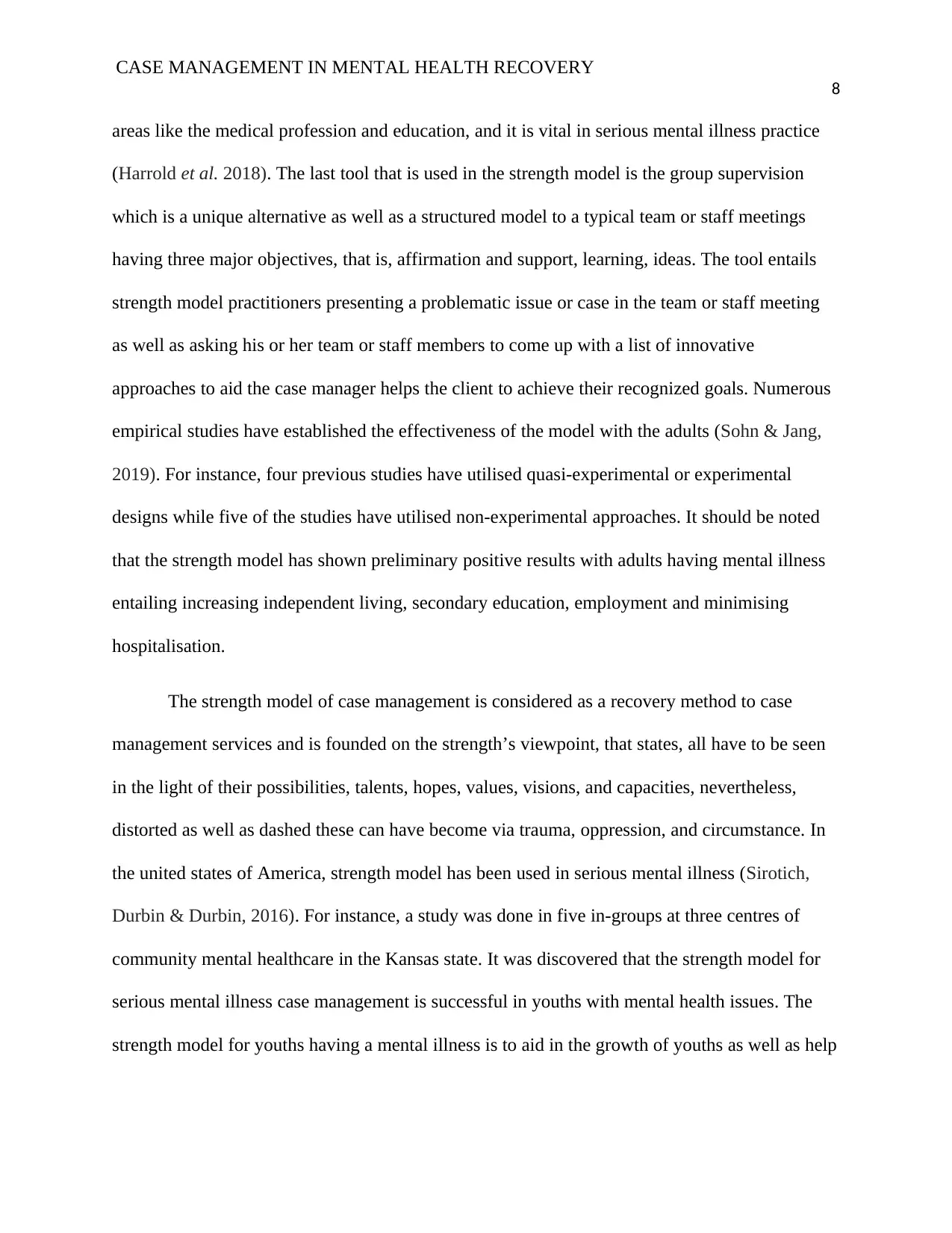
CASE MANAGEMENT IN MENTAL HEALTH RECOVERY
8
areas like the medical profession and education, and it is vital in serious mental illness practice
(Harrold et al. 2018). The last tool that is used in the strength model is the group supervision
which is a unique alternative as well as a structured model to a typical team or staff meetings
having three major objectives, that is, affirmation and support, learning, ideas. The tool entails
strength model practitioners presenting a problematic issue or case in the team or staff meeting
as well as asking his or her team or staff members to come up with a list of innovative
approaches to aid the case manager helps the client to achieve their recognized goals. Numerous
empirical studies have established the effectiveness of the model with the adults (Sohn & Jang,
2019). For instance, four previous studies have utilised quasi-experimental or experimental
designs while five of the studies have utilised non-experimental approaches. It should be noted
that the strength model has shown preliminary positive results with adults having mental illness
entailing increasing independent living, secondary education, employment and minimising
hospitalisation.
The strength model of case management is considered as a recovery method to case
management services and is founded on the strength’s viewpoint, that states, all have to be seen
in the light of their possibilities, talents, hopes, values, visions, and capacities, nevertheless,
distorted as well as dashed these can have become via trauma, oppression, and circumstance. In
the united states of America, strength model has been used in serious mental illness (Sirotich,
Durbin & Durbin, 2016). For instance, a study was done in five in-groups at three centres of
community mental healthcare in the Kansas state. It was discovered that the strength model for
serious mental illness case management is successful in youths with mental health issues. The
strength model for youths having a mental illness is to aid in the growth of youths as well as help
8
areas like the medical profession and education, and it is vital in serious mental illness practice
(Harrold et al. 2018). The last tool that is used in the strength model is the group supervision
which is a unique alternative as well as a structured model to a typical team or staff meetings
having three major objectives, that is, affirmation and support, learning, ideas. The tool entails
strength model practitioners presenting a problematic issue or case in the team or staff meeting
as well as asking his or her team or staff members to come up with a list of innovative
approaches to aid the case manager helps the client to achieve their recognized goals. Numerous
empirical studies have established the effectiveness of the model with the adults (Sohn & Jang,
2019). For instance, four previous studies have utilised quasi-experimental or experimental
designs while five of the studies have utilised non-experimental approaches. It should be noted
that the strength model has shown preliminary positive results with adults having mental illness
entailing increasing independent living, secondary education, employment and minimising
hospitalisation.
The strength model of case management is considered as a recovery method to case
management services and is founded on the strength’s viewpoint, that states, all have to be seen
in the light of their possibilities, talents, hopes, values, visions, and capacities, nevertheless,
distorted as well as dashed these can have become via trauma, oppression, and circumstance. In
the united states of America, strength model has been used in serious mental illness (Sirotich,
Durbin & Durbin, 2016). For instance, a study was done in five in-groups at three centres of
community mental healthcare in the Kansas state. It was discovered that the strength model for
serious mental illness case management is successful in youths with mental health issues. The
strength model for youths having a mental illness is to aid in the growth of youths as well as help
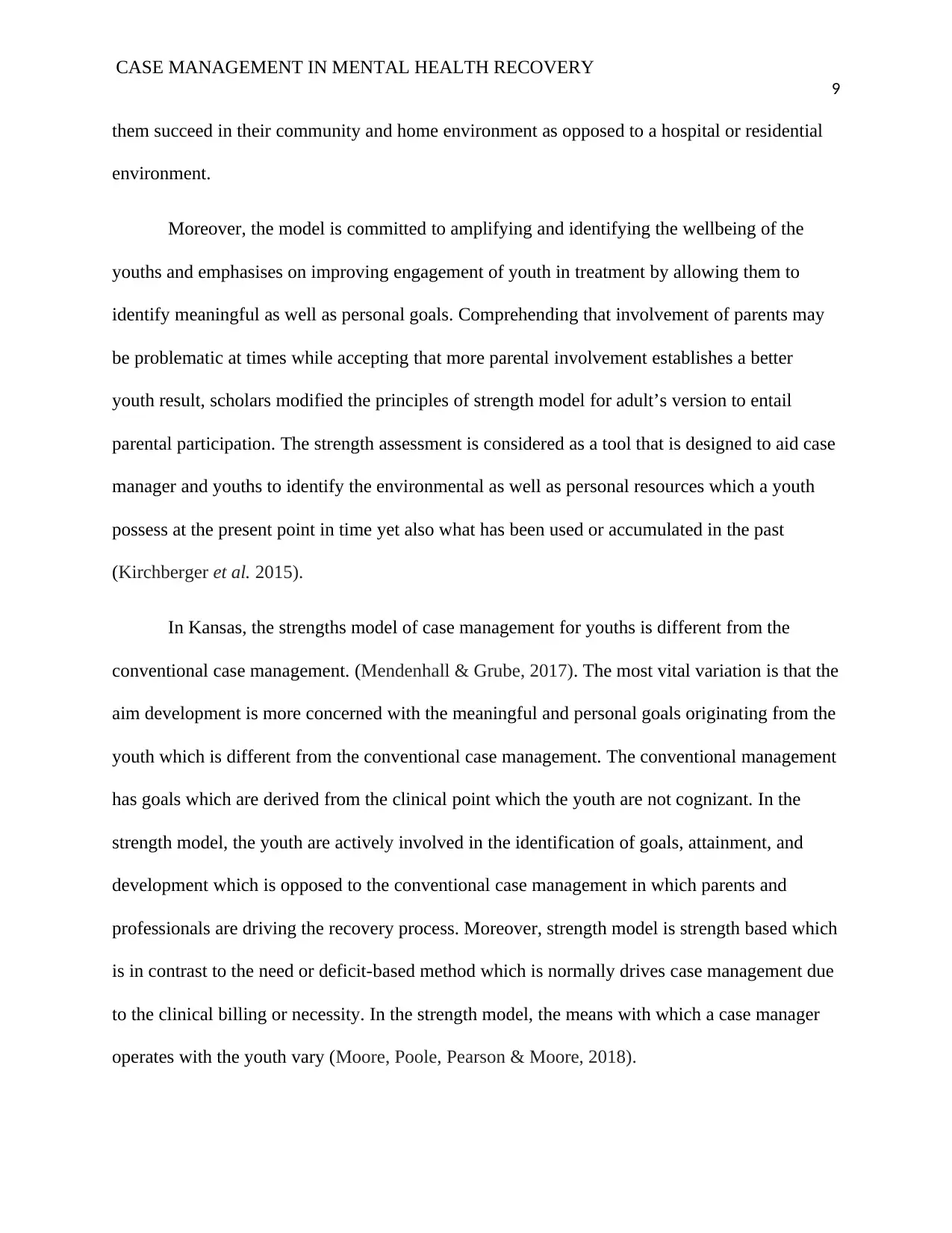
CASE MANAGEMENT IN MENTAL HEALTH RECOVERY
9
them succeed in their community and home environment as opposed to a hospital or residential
environment.
Moreover, the model is committed to amplifying and identifying the wellbeing of the
youths and emphasises on improving engagement of youth in treatment by allowing them to
identify meaningful as well as personal goals. Comprehending that involvement of parents may
be problematic at times while accepting that more parental involvement establishes a better
youth result, scholars modified the principles of strength model for adult’s version to entail
parental participation. The strength assessment is considered as a tool that is designed to aid case
manager and youths to identify the environmental as well as personal resources which a youth
possess at the present point in time yet also what has been used or accumulated in the past
(Kirchberger et al. 2015).
In Kansas, the strengths model of case management for youths is different from the
conventional case management. (Mendenhall & Grube, 2017). The most vital variation is that the
aim development is more concerned with the meaningful and personal goals originating from the
youth which is different from the conventional case management. The conventional management
has goals which are derived from the clinical point which the youth are not cognizant. In the
strength model, the youth are actively involved in the identification of goals, attainment, and
development which is opposed to the conventional case management in which parents and
professionals are driving the recovery process. Moreover, strength model is strength based which
is in contrast to the need or deficit-based method which is normally drives case management due
to the clinical billing or necessity. In the strength model, the means with which a case manager
operates with the youth vary (Moore, Poole, Pearson & Moore, 2018).
9
them succeed in their community and home environment as opposed to a hospital or residential
environment.
Moreover, the model is committed to amplifying and identifying the wellbeing of the
youths and emphasises on improving engagement of youth in treatment by allowing them to
identify meaningful as well as personal goals. Comprehending that involvement of parents may
be problematic at times while accepting that more parental involvement establishes a better
youth result, scholars modified the principles of strength model for adult’s version to entail
parental participation. The strength assessment is considered as a tool that is designed to aid case
manager and youths to identify the environmental as well as personal resources which a youth
possess at the present point in time yet also what has been used or accumulated in the past
(Kirchberger et al. 2015).
In Kansas, the strengths model of case management for youths is different from the
conventional case management. (Mendenhall & Grube, 2017). The most vital variation is that the
aim development is more concerned with the meaningful and personal goals originating from the
youth which is different from the conventional case management. The conventional management
has goals which are derived from the clinical point which the youth are not cognizant. In the
strength model, the youth are actively involved in the identification of goals, attainment, and
development which is opposed to the conventional case management in which parents and
professionals are driving the recovery process. Moreover, strength model is strength based which
is in contrast to the need or deficit-based method which is normally drives case management due
to the clinical billing or necessity. In the strength model, the means with which a case manager
operates with the youth vary (Moore, Poole, Pearson & Moore, 2018).
⊘ This is a preview!⊘
Do you want full access?
Subscribe today to unlock all pages.

Trusted by 1+ million students worldwide
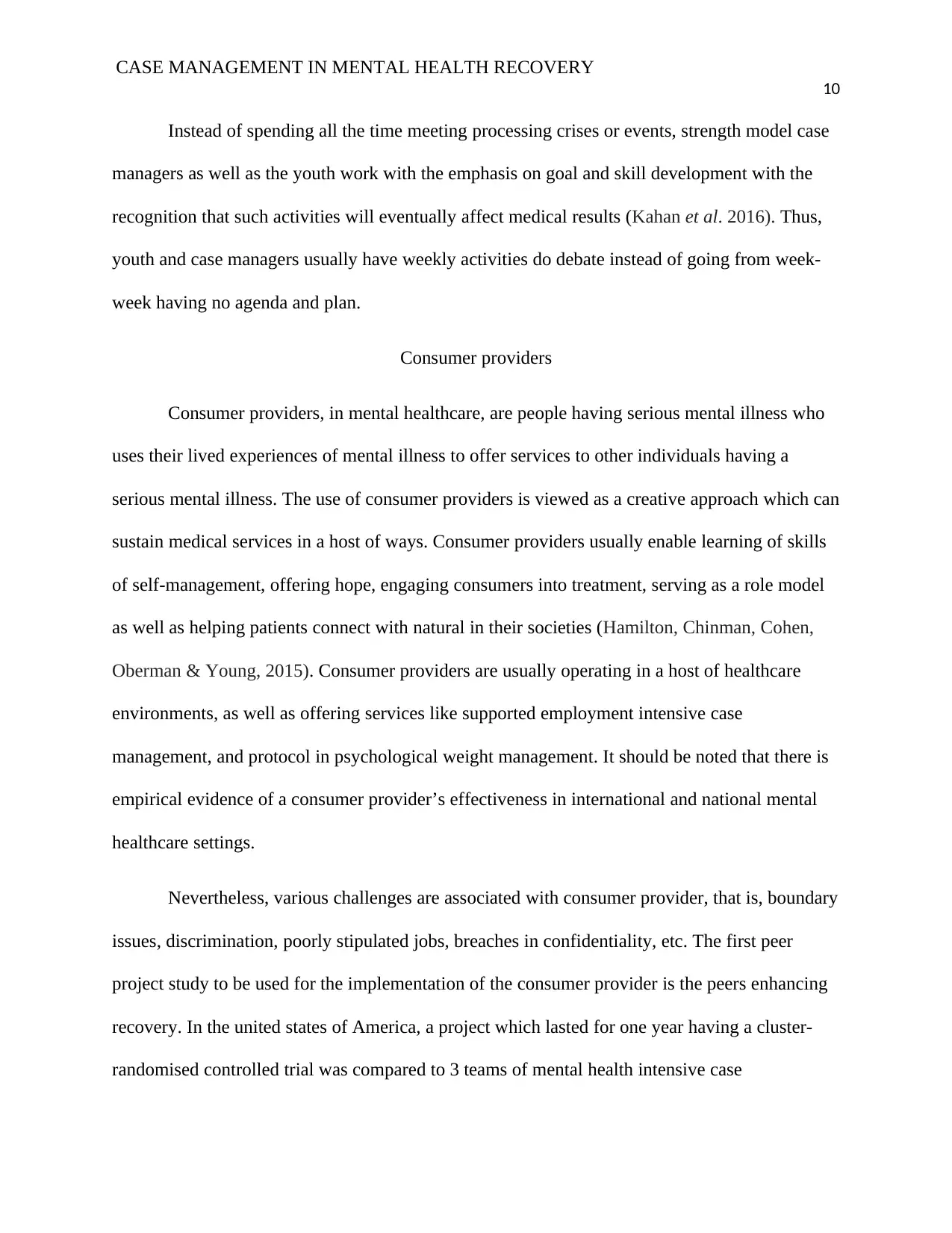
CASE MANAGEMENT IN MENTAL HEALTH RECOVERY
10
Instead of spending all the time meeting processing crises or events, strength model case
managers as well as the youth work with the emphasis on goal and skill development with the
recognition that such activities will eventually affect medical results (Kahan et al. 2016). Thus,
youth and case managers usually have weekly activities do debate instead of going from week-
week having no agenda and plan.
Consumer providers
Consumer providers, in mental healthcare, are people having serious mental illness who
uses their lived experiences of mental illness to offer services to other individuals having a
serious mental illness. The use of consumer providers is viewed as a creative approach which can
sustain medical services in a host of ways. Consumer providers usually enable learning of skills
of self-management, offering hope, engaging consumers into treatment, serving as a role model
as well as helping patients connect with natural in their societies (Hamilton, Chinman, Cohen,
Oberman & Young, 2015). Consumer providers are usually operating in a host of healthcare
environments, as well as offering services like supported employment intensive case
management, and protocol in psychological weight management. It should be noted that there is
empirical evidence of a consumer provider’s effectiveness in international and national mental
healthcare settings.
Nevertheless, various challenges are associated with consumer provider, that is, boundary
issues, discrimination, poorly stipulated jobs, breaches in confidentiality, etc. The first peer
project study to be used for the implementation of the consumer provider is the peers enhancing
recovery. In the united states of America, a project which lasted for one year having a cluster-
randomised controlled trial was compared to 3 teams of mental health intensive case
10
Instead of spending all the time meeting processing crises or events, strength model case
managers as well as the youth work with the emphasis on goal and skill development with the
recognition that such activities will eventually affect medical results (Kahan et al. 2016). Thus,
youth and case managers usually have weekly activities do debate instead of going from week-
week having no agenda and plan.
Consumer providers
Consumer providers, in mental healthcare, are people having serious mental illness who
uses their lived experiences of mental illness to offer services to other individuals having a
serious mental illness. The use of consumer providers is viewed as a creative approach which can
sustain medical services in a host of ways. Consumer providers usually enable learning of skills
of self-management, offering hope, engaging consumers into treatment, serving as a role model
as well as helping patients connect with natural in their societies (Hamilton, Chinman, Cohen,
Oberman & Young, 2015). Consumer providers are usually operating in a host of healthcare
environments, as well as offering services like supported employment intensive case
management, and protocol in psychological weight management. It should be noted that there is
empirical evidence of a consumer provider’s effectiveness in international and national mental
healthcare settings.
Nevertheless, various challenges are associated with consumer provider, that is, boundary
issues, discrimination, poorly stipulated jobs, breaches in confidentiality, etc. The first peer
project study to be used for the implementation of the consumer provider is the peers enhancing
recovery. In the united states of America, a project which lasted for one year having a cluster-
randomised controlled trial was compared to 3 teams of mental health intensive case
Paraphrase This Document
Need a fresh take? Get an instant paraphrase of this document with our AI Paraphraser
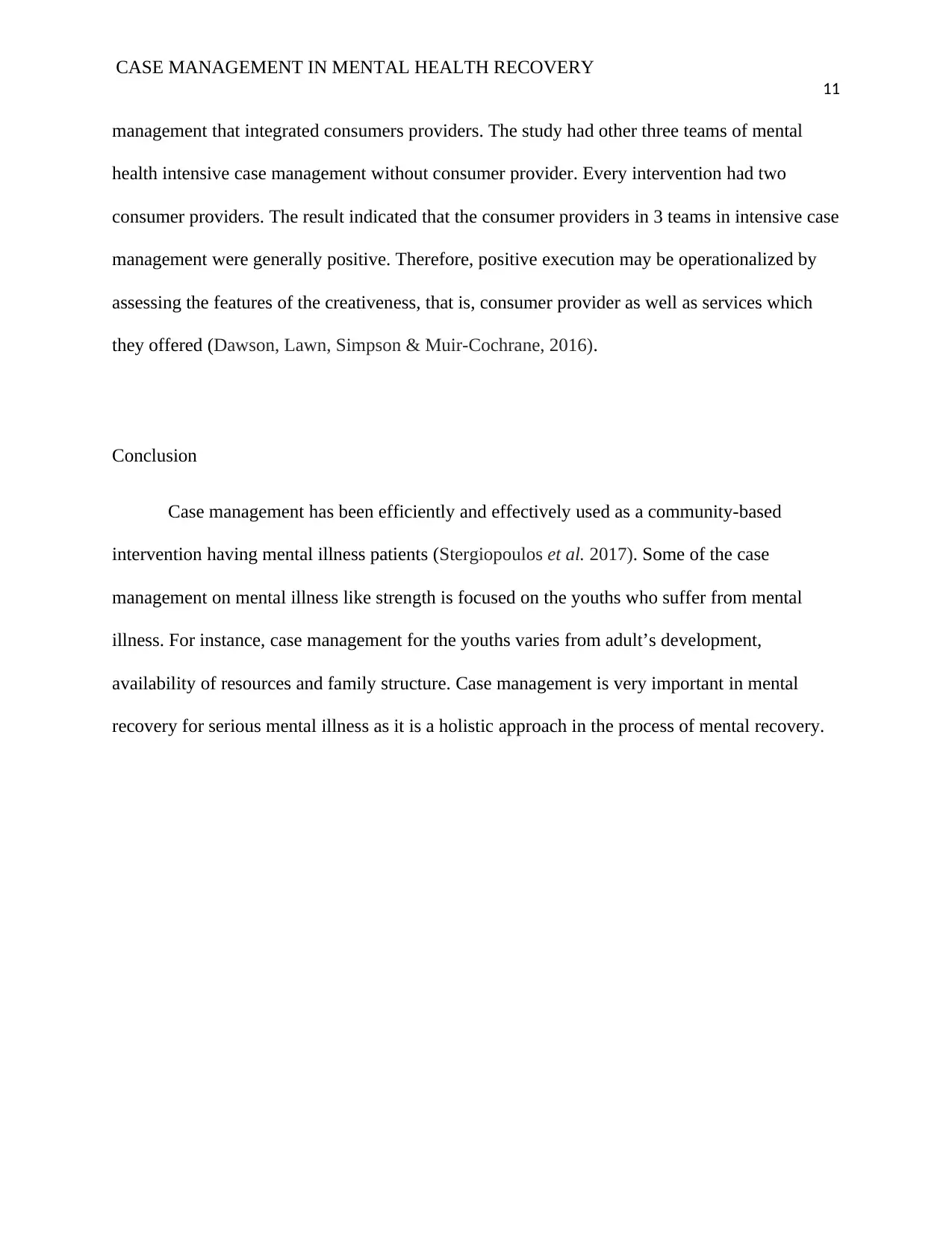
CASE MANAGEMENT IN MENTAL HEALTH RECOVERY
11
management that integrated consumers providers. The study had other three teams of mental
health intensive case management without consumer provider. Every intervention had two
consumer providers. The result indicated that the consumer providers in 3 teams in intensive case
management were generally positive. Therefore, positive execution may be operationalized by
assessing the features of the creativeness, that is, consumer provider as well as services which
they offered (Dawson, Lawn, Simpson & Muir-Cochrane, 2016).
Conclusion
Case management has been efficiently and effectively used as a community-based
intervention having mental illness patients (Stergiopoulos et al. 2017). Some of the case
management on mental illness like strength is focused on the youths who suffer from mental
illness. For instance, case management for the youths varies from adult’s development,
availability of resources and family structure. Case management is very important in mental
recovery for serious mental illness as it is a holistic approach in the process of mental recovery.
11
management that integrated consumers providers. The study had other three teams of mental
health intensive case management without consumer provider. Every intervention had two
consumer providers. The result indicated that the consumer providers in 3 teams in intensive case
management were generally positive. Therefore, positive execution may be operationalized by
assessing the features of the creativeness, that is, consumer provider as well as services which
they offered (Dawson, Lawn, Simpson & Muir-Cochrane, 2016).
Conclusion
Case management has been efficiently and effectively used as a community-based
intervention having mental illness patients (Stergiopoulos et al. 2017). Some of the case
management on mental illness like strength is focused on the youths who suffer from mental
illness. For instance, case management for the youths varies from adult’s development,
availability of resources and family structure. Case management is very important in mental
recovery for serious mental illness as it is a holistic approach in the process of mental recovery.
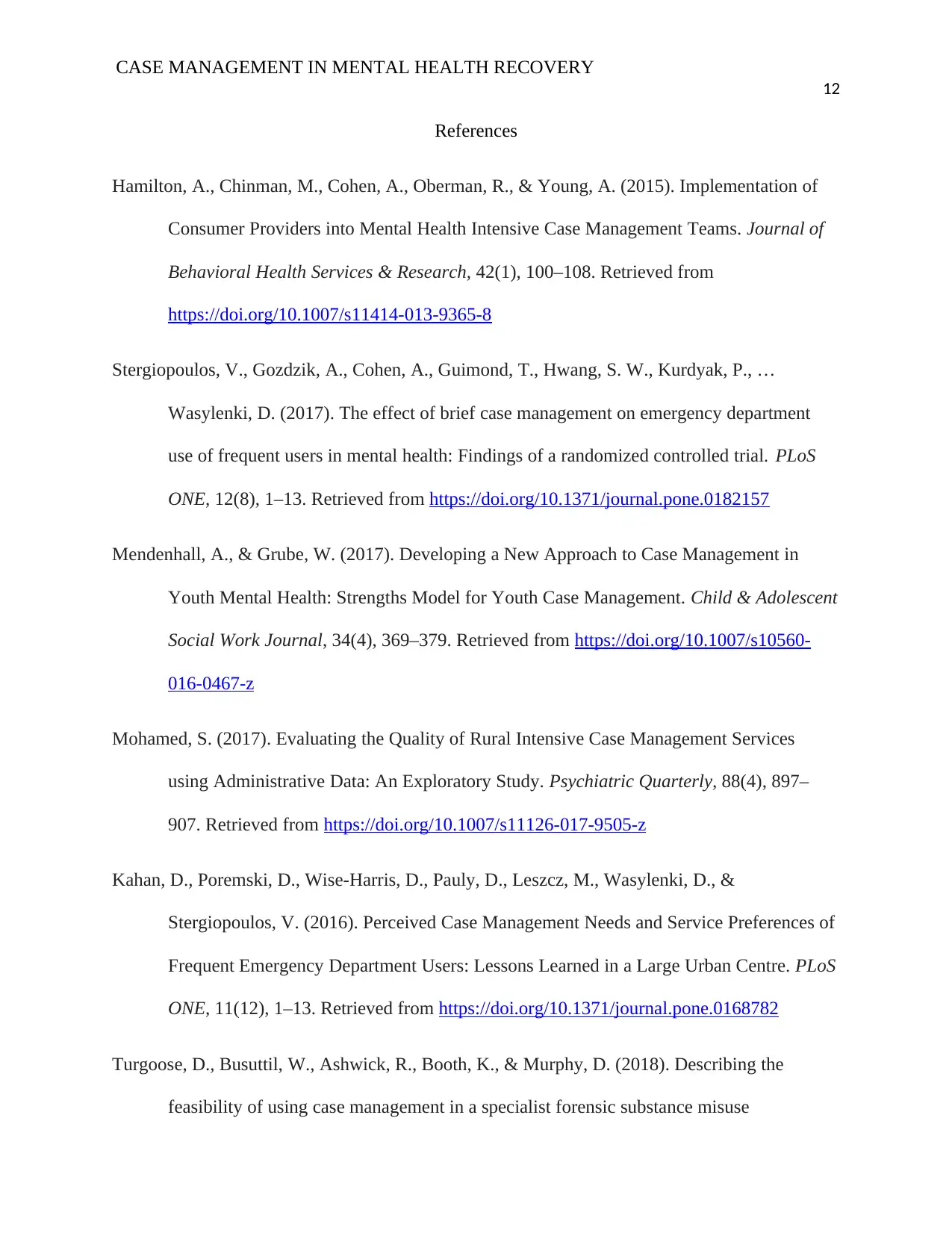
CASE MANAGEMENT IN MENTAL HEALTH RECOVERY
12
References
Hamilton, A., Chinman, M., Cohen, A., Oberman, R., & Young, A. (2015). Implementation of
Consumer Providers into Mental Health Intensive Case Management Teams. Journal of
Behavioral Health Services & Research, 42(1), 100–108. Retrieved from
https://doi.org/10.1007/s11414-013-9365-8
Stergiopoulos, V., Gozdzik, A., Cohen, A., Guimond, T., Hwang, S. W., Kurdyak, P., …
Wasylenki, D. (2017). The effect of brief case management on emergency department
use of frequent users in mental health: Findings of a randomized controlled trial. PLoS
ONE, 12(8), 1–13. Retrieved from https://doi.org/10.1371/journal.pone.0182157
Mendenhall, A., & Grube, W. (2017). Developing a New Approach to Case Management in
Youth Mental Health: Strengths Model for Youth Case Management. Child & Adolescent
Social Work Journal, 34(4), 369–379. Retrieved from https://doi.org/10.1007/s10560-
016-0467-z
Mohamed, S. (2017). Evaluating the Quality of Rural Intensive Case Management Services
using Administrative Data: An Exploratory Study. Psychiatric Quarterly, 88(4), 897–
907. Retrieved from https://doi.org/10.1007/s11126-017-9505-z
Kahan, D., Poremski, D., Wise-Harris, D., Pauly, D., Leszcz, M., Wasylenki, D., &
Stergiopoulos, V. (2016). Perceived Case Management Needs and Service Preferences of
Frequent Emergency Department Users: Lessons Learned in a Large Urban Centre. PLoS
ONE, 11(12), 1–13. Retrieved from https://doi.org/10.1371/journal.pone.0168782
Turgoose, D., Busuttil, W., Ashwick, R., Booth, K., & Murphy, D. (2018). Describing the
feasibility of using case management in a specialist forensic substance misuse
12
References
Hamilton, A., Chinman, M., Cohen, A., Oberman, R., & Young, A. (2015). Implementation of
Consumer Providers into Mental Health Intensive Case Management Teams. Journal of
Behavioral Health Services & Research, 42(1), 100–108. Retrieved from
https://doi.org/10.1007/s11414-013-9365-8
Stergiopoulos, V., Gozdzik, A., Cohen, A., Guimond, T., Hwang, S. W., Kurdyak, P., …
Wasylenki, D. (2017). The effect of brief case management on emergency department
use of frequent users in mental health: Findings of a randomized controlled trial. PLoS
ONE, 12(8), 1–13. Retrieved from https://doi.org/10.1371/journal.pone.0182157
Mendenhall, A., & Grube, W. (2017). Developing a New Approach to Case Management in
Youth Mental Health: Strengths Model for Youth Case Management. Child & Adolescent
Social Work Journal, 34(4), 369–379. Retrieved from https://doi.org/10.1007/s10560-
016-0467-z
Mohamed, S. (2017). Evaluating the Quality of Rural Intensive Case Management Services
using Administrative Data: An Exploratory Study. Psychiatric Quarterly, 88(4), 897–
907. Retrieved from https://doi.org/10.1007/s11126-017-9505-z
Kahan, D., Poremski, D., Wise-Harris, D., Pauly, D., Leszcz, M., Wasylenki, D., &
Stergiopoulos, V. (2016). Perceived Case Management Needs and Service Preferences of
Frequent Emergency Department Users: Lessons Learned in a Large Urban Centre. PLoS
ONE, 11(12), 1–13. Retrieved from https://doi.org/10.1371/journal.pone.0168782
Turgoose, D., Busuttil, W., Ashwick, R., Booth, K., & Murphy, D. (2018). Describing the
feasibility of using case management in a specialist forensic substance misuse
⊘ This is a preview!⊘
Do you want full access?
Subscribe today to unlock all pages.

Trusted by 1+ million students worldwide
1 out of 15
Related Documents
Your All-in-One AI-Powered Toolkit for Academic Success.
+13062052269
info@desklib.com
Available 24*7 on WhatsApp / Email
![[object Object]](/_next/static/media/star-bottom.7253800d.svg)
Unlock your academic potential
Copyright © 2020–2026 A2Z Services. All Rights Reserved. Developed and managed by ZUCOL.





